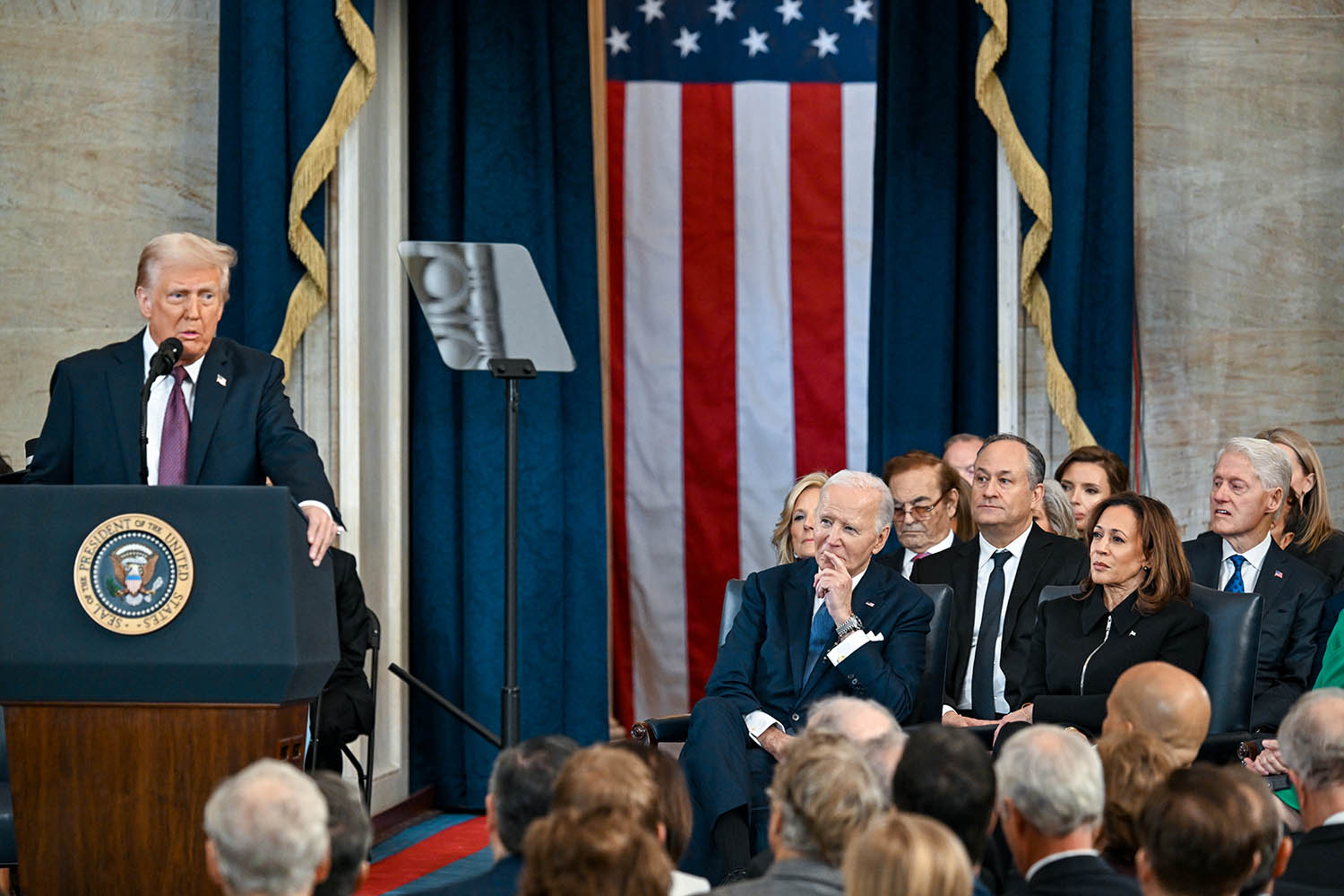“The whole world was against me, and I won.” So said President Trump, as self-regarding as always, in an interview he gave 10 days before his second inauguration to three White House correspondents: Josh Dawsey of the Wall Street Journal, Tyler Pager of the New York Times and Isaac Arnsdorf of the Washington Post. Dawsey, Pager and Arnsdorf have conducted more than 300 interviews in the campaign teams of Donald Trump, Joe Biden and Kamala Harris, in a bid to explain this tumultuous period in American politics.
They do so with a rigour and craft unsurpassed in political campaign reporting: 2024 is the best book of its kind I have read, and credit for that is due to the unusual lengths to which Dawsey, Pager and Arnsdorf have gone to ensure factual accuracy. The authors have returned to all three campaign teams – Trump, Biden and Harris – to seek their assistance as fact-checkers.
And there are a lot of facts to check. Every page is packed with insider detail to tell the story of how Donald Trump navigated 12 primary challenges, four indictments and an assassination attempt on his way back to the White House. The Donald Trump of this book has all his characteristic egoism, but also more anxiety than one might expect, especially at the prospect of Ron DeSantis (“DeSanctimonious” as Trump calls him) running for the Republican nomination. One of the best set-pieces in the book is the story of the Trump campaign ad that features DeSantis eating a chocolate pudding with his fingers.
Trump is depicted as needy in his relationships with members of staff. He values loyalty above all other traits but also wants people who get things done. He is not above making his peace with competent people whom he once regarded as not on his side, such as Susie Wiles, who had led DeSantis’s campaign for the 2018 Florida gubernatorial election, but who has become, as chief of staff in the White House, the woman without whom Trump would be lost. Every so often we glimpse the attractive Donald Trump that, evidently, a lot of Americans see. He is often funny and, once he settles on someone as an ally, he returns their loyalty.
We get a lot of irrelevant detail: after his win, Trump ate fried shrimp dipped in tartare sauce
We get a lot of irrelevant detail: after his win, Trump ate fried shrimp dipped in tartare sauce
At camp Biden, the authors go behind the scenes of the most consequential event in the book: the decision by the Biden team to bring forward the first presidential debate to exhibit the sitting president’s mental prowess. Disastrously, it had exactly the opposite effect. Then, having decided that Biden should soldier on, his senior team agonise over whether the president should take a cognitive test early in 2024 to prove his fitness for office. In the event, they decided that the need for such a test would suggest the worst, irrespective of its outcome. Yet, strangely – somewhat at odds with the damning picture painted by Original Sin, Jake Tapper and Alex Thompson’s recent book about Biden’s decline – here his debate performance seems like a dreadful aberration. Even as late as the handover meeting at the White House after the election, Trump notes that, to his surprise, Biden spoke lucidly throughout his foreign policy briefing on Ukraine.
The book is full of such arresting, close details: this is the most well-sourced and judiciously written reporting from the campaign that you will find. Still, it cannot avoid the flaws that are common to all volumes of this type.
The demand for intimacy means we get a lot of irrelevant detail, usually about food. At his big planning meeting at Mar-a-Lago after his victory, Trump ate fried shrimp dipped in tartare sauce. (Real history books do not include this information. “After a hearty cauliflower cheese at the Yalta Kitchen, Stalin and Churchill got down to negotiation,” wrote no historian, ever.) This is not a trivial objection: historical writing is a question of sifting what is significant and eliminating what is not. This book chucks it all in. Because they know, we have to know. But not everything that is interesting is important.
The crucial moment for Joe Biden in fact takes place long before the narrative of this book begins. In 2024, Biden still harbours the resentment that, in 2016, he should not have let Barack Obama talk him out of running against Hillary Clinton to become the Democratic candidate. Biden always regretted the decision and always thought, not without reason, that he would have beaten Trump. This fateful moment deserves greater scrutiny than it receives. If Biden had stood and defeated Trump, perhaps Trump would have been forcibly retired as a politician: as the man who lost an election the Republican party really ought to have won.
This book’s claim on your attention rests on the authors’ suggestion that “the election hinged on accidents and individual decisions that had enormous consequences and might just have easily gone another way”. The trouble with this is that it’s not really true. The identity of the characters mattered. Once it became clear that the race was between Trump and Harris, campaign staff ceased to decide the election. Donald Trump isn’t president because of the deployment of canvassers to Ohio or because of the mistakes made by Kamala Harris’s people. The story of President Trump is a far bigger story. It will take a longer perspective, and a shorter book, to tell it.
2024 by Josh Dawsey, Tyler Pager & Isaac Arnsdorf (Cornerstone, £25). Order a copy at observershop.co.uk for £22.50. Delivery charges may apply
Newsletters
Choose the newsletters you want to receive
View more
For information about how The Observer protects your data, read our Privacy Policy
Photograph by Getty Images

